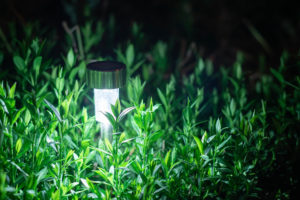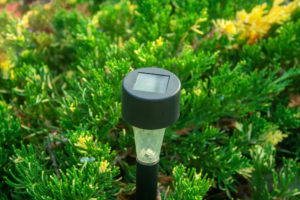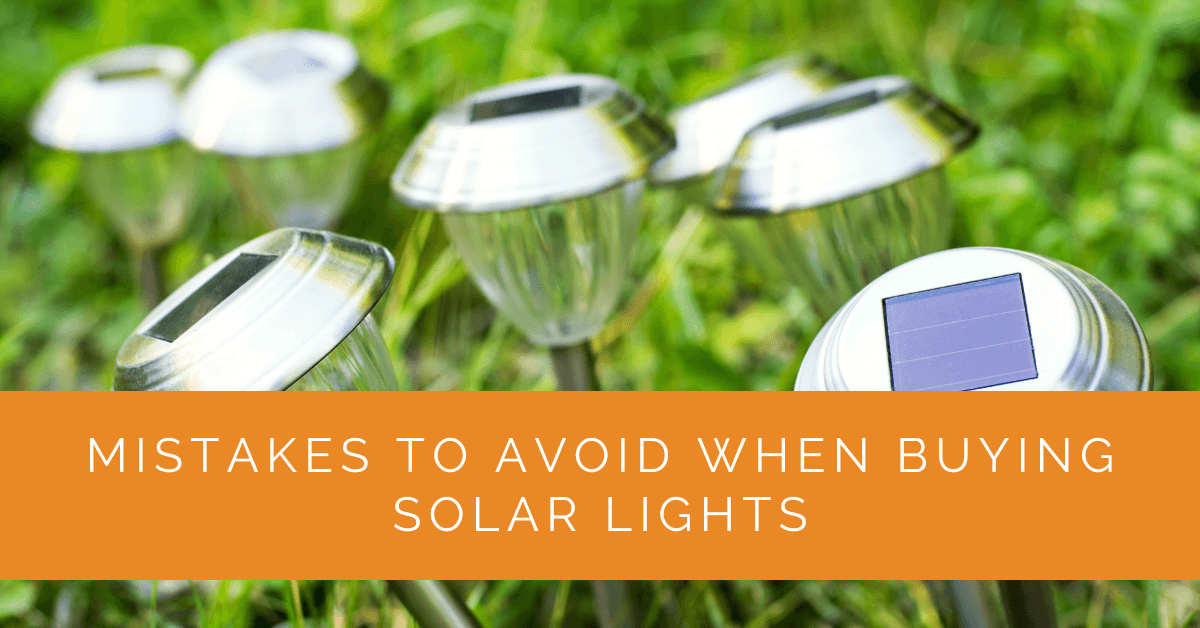Solar lights are an excellent choice for sustainable outdoor lighting, harnessing the sun’s power to illuminate your surroundings. However, it’s important to make informed decisions when purchasing solar lights. In this article, we’ll discuss common mistakes to avoid to ensure you get the most out of your solar lighting investment.
Contents
- 1 1. Neglecting the Quality of the Solar Panel
- 2 2. Overlooking Battery Capacity
- 3 3. Ignoring Wattage and Lumen Output
- 4 4. Not Considering the Charge Controller
- 5 5. Buying Cheap or Substandard Solar Lights
- 6 6. Disregarding Weatherproofing and Durability
- 7 7. Neglecting Installation and Maintenance Requirements
- 8 Case Study: Avoiding Common Mistakes When Purchasing Solar Lights
- 9 Expert Insights From Our Solar Panel Installers About Avoiding Mistakes When Buying Solar Lights
- 10 Our Expertise in Solar Lights
- 11 Conclusion
1. Neglecting the Quality of the Solar Panel
The solar panel is the heart of any solar light system. It harnesses sunlight and converts it into electrical energy. Neglecting the solar panel’s quality can significantly impact your solar lights’ performance and longevity. Here are some key considerations:
- Efficiency: Look for solar panels with high-efficiency ratings. The efficiency of a solar panel determines how effectively it can convert sunlight into electricity. Opt for panels with a high percentage of efficiency to maximize energy conversion and ensure better overall performance.
- Material and Build: Consider the materials used in solar panel construction. High-quality panels are typically made from monocrystalline or polycrystalline silicon, which offers durability and better energy conversion. Check for certifications or reputable brands known for producing reliable solar panels.
- Warranty: A warranty is an important aspect when evaluating solar panels. It provides peace of mind and protection against potential defects or performance issues. Look for solar panels with substantial warranties to ensure you can get support in case of any problems.
2. Overlooking Battery Capacity
The battery capacity is critical when buying solar lights, as it determines how long the lights can illuminate during the night. To avoid disappointment and ensure sufficient lighting duration, pay attention to the battery capacity:
- Calculate Energy Needs: Assess your lighting requirements by determining the hours you need to operate and the power consumption of the chosen solar light model. Use this information to calculate the required battery capacity.
- Consider Backup Days: If you live in an area with prolonged cloudy days or limited sunlight, it’s advisable to choose a solar light with a battery capacity that can provide power for additional days without sunlight. This ensures your lights can continue to operate even during unfavorable weather conditions.
- Battery Type: There are different types of batteries used in solar lights, including lithium-ion, lead-acid, and nickel-metal hydride (NiMH). Each has its own characteristics and performance attributes. Research and compare the pros and cons of different battery types to determine the most suitable one for your needs.

3. Ignoring Wattage and Lumen Output
Wattage and lumen output are key specifications that determine the brightness and intensity of the light emitted by solar lights. Avoid the mistake of overlooking these important factors:
- Wattage: Wattage refers to the power consumption of the solar light. Higher wattage generally indicates brighter lighting. Consider the area you want to illuminate and the desired brightness level when selecting the appropriate wattage. Keep in mind that higher-wattage lights may have shorter battery life.
- Lumen Output: Lumen output measures the total amount of visible light emitted by the solar light source. It indicates the brightness perceived by the human eye. Higher lumen output translates to brighter illumination. Consider the purpose of the lighting, such as functional or decorative, and the area size to determine the suitable lumen output for optimal visibility.
- Balance Brightness and Efficiency: While it’s tempting to opt for the brightest solar lights available, balance brightness and energy efficiency. Higher lumen output may consume more power, leading to shorter lighting duration. Choose solar lights that provide the desired brightness while considering energy conservation.
4. Not Considering the Charge Controller
The charge controller plays a crucial role in regulating the charging and discharging of the battery, ensuring its longevity and optimal performance. Don’t overlook the importance of the charge controller:
- Match the Controller: Select a solar light with a charge controller suitable for the specific battery type and capacity. Mismatched charge controllers can lead to inefficient charging, overcharging, or damage to the battery.
- MPPT vs. PWM: Charge controllers are available in two main types: Maximum Power Point Tracking (MPPT) and Pulse Width Modulation (PWM). MPPT controllers are more advanced and efficient, especially when solar panel output fluctuates or in low-light conditions. Consider investing in an MPPT charge controller for better energy conversion and improved overall system performance.

5. Buying Cheap or Substandard Solar Lights
It’s tempting to opt for cheaper solar lights to save money initially, but this can often lead to disappointment and frustration down the line. Avoid the mistake of purchasing low-quality or substandard solar lights by considering the following factors:
- Reputable Brands: Research reputable brands known for producing reliable solar lights. Established brands often have a reputation to uphold and are more likely to offer better quality products and customer support.
- Customer Reviews and Recommendations: Look for customer reviews and ratings online to gauge the performance and reliability of the solar lights you are considering. Additionally, seek recommendations from trusted sources such as friends, family, or solar energy professionals with firsthand experience with solar lighting systems.
- Quality Components: Examine the overall build quality of the solar lights, including the housing, connectors, and wiring. Ensure the materials are durable, weather-resistant, and designed to withstand outdoor conditions.
- Long-Term Investment: Remember that solar lights are a long-term investment. Spending more on higher-quality solar lights may save you money in the long run, as they will likely have better performance, longevity, and warranty coverage.
6. Disregarding Weatherproofing and Durability
When purchasing solar lights, it’s crucial to consider their ability to withstand various weather conditions and their overall durability. Here’s what to keep in mind:
- Weatherproof Ratings: Look for solar lights with a high IP (Ingress Protection) rating. This rating indicates the level of protection against dust and water. For outdoor use, choose lights with an IP65 or higher rating, ensuring they are completely protected against dust and resistant to water jets.
- Durable Materials: Check the construction materials of the solar lights. High-quality lights often feature sturdy materials such as aluminum, stainless steel, or UV-resistant ABS plastic. These materials offer resistance against UV rays, corrosion, and impact, ensuring the lights can withstand harsh weather conditions.
- Temperature Tolerance: Consider the temperature range that the solar lights can withstand. Extreme heat or freezing temperatures can impact the performance and lifespan of the lights. Opt for lights that withstand a wide temperature range, ensuring they can function optimally in various climates.
- Sealed Design: Look for solar lights with a sealed design to prevent water ingress and ensure long-lasting performance. Sealed lights offer added protection against moisture, preventing internal damage and extending the lights’ lifespan.
- Warranty and Certifications: Check if the solar lights have a warranty covering weather-related damages. Additionally, look for certifications such as UL (Underwriters Laboratories) or CE (Conformité Européene) to ensure the lights meet safety and quality standards.

7. Neglecting Installation and Maintenance Requirements
Improper installation and neglecting regular maintenance can affect the performance and longevity of your solar lights. Pay attention to the following aspects:
- Installation Guidelines: Follow the manufacturer’s installation guidelines carefully to ensure proper placement and positioning of the solar lights. Place the lights in areas where they receive maximum sunlight exposure, avoiding shading from nearby structures or foliage. Proper positioning will optimize the charging capabilities of the solar panel.
- Wiring and Connections: Pay attention to the wiring and connections during installation. Ensure all connections are secure and weather-resistant to prevent damage or power loss. Improper wiring can lead to inefficiencies or malfunctioning of the solar lights.
- Regular Cleaning: Solar panels require regular cleaning to maintain their efficiency. Dust, debris, or bird droppings can obstruct sunlight absorption and reduce the overall performance of the lights. Clean the solar panels periodically using a soft cloth or sponge with mild detergent and water. Avoid abrasive materials that can scratch the panel surface.
- Battery Maintenance: Some solar lights have replaceable batteries, while others have integrated batteries. Check the manufacturer’s recommendations for battery maintenance and replacement intervals if your solar lights have replaceable batteries. Integrated batteries generally require less maintenance but may eventually need to be replaced. Monitor battery performance and consult the manufacturer for any specific maintenance instructions.
- Seasonal Adjustments: In certain regions, sunlight availability may vary throughout the year due to seasonal changes. Consider adjusting the positioning or angling of the solar lights to optimize solar energy absorption during different seasons. This adjustment can ensure consistent performance year-round.
Case Study: Avoiding Common Mistakes When Purchasing Solar Lights
Background
At Solar Panels Network USA, we pride ourselves on helping customers make informed decisions about solar energy solutions. One of our recent projects involved a homeowner looking to install solar lights in their garden and around their property. The goal was to provide sustainable outdoor lighting while avoiding common pitfalls that could affect performance and longevity.
Project Overview
The project aimed to illuminate the garden paths, patio, and driveway with solar lights. The homeowner wanted reliable, long-lasting lighting that required minimal maintenance and provided consistent performance year-round.
Implementation
Assessment and Planning
- Site Analysis: Our team conducted a thorough site analysis to identify optimal locations for the solar lights. We considered factors such as sunlight exposure, potential shading from trees and buildings, and the desired brightness levels for different areas.
- Product Selection: Based on the site analysis, we recommended high-quality solar lights from reputable brands. We selected lights with efficient solar panels, adequate battery capacity, and robust weatherproofing to ensure durability and performance.
Installation Process
- Proper Placement: We installed the solar lights in locations with maximum sunlight exposure, avoiding shaded areas. This ensured the solar panels could charge efficiently throughout the day.
- Wiring and Connections: The installation included secure and weather-resistant wiring and connections to prevent damage and power loss. We ensured all connections were well-insulated and protected from the elements.
- System Testing: After installation, we tested the system to verify that the solar lights were functioning correctly and providing the desired illumination levels.
Results
- Enhanced Performance: The selected solar lights provided consistent and reliable illumination throughout the property. The high-efficiency solar panels and adequate battery capacity ensured the lights remained operational even during cloudy days.
- Durability and Longevity: The lights’ robust construction and weatherproof design withstood various weather conditions, including rain and snow. This durability reduced the need for frequent maintenance and replacements.
- Customer Satisfaction: The homeowner was pleased with the results, particularly the quality and reliability of the solar lights. The project demonstrated the importance of avoiding common mistakes when purchasing solar lights, leading to a successful and sustainable lighting solution.
Summary
This case study highlights the importance of making informed decisions when buying solar lights. By focusing on quality components, proper installation, and careful planning, Solar Panels Network USA helped the homeowner achieve a reliable and sustainable outdoor lighting solution. The project underscores the value of selecting high-efficiency solar panels, adequate battery capacity, and durable materials to avoid common mistakes and ensure long-term satisfaction.
Expert Insights From Our Solar Panel Installers About Avoiding Mistakes When Buying Solar Lights
Choosing high-quality solar panels is crucial for the performance and longevity of your solar lights. Always look for panels with high efficiency and good build quality, as these factors directly impact energy conversion and durability.
Senior Solar Technician
Neglecting battery capacity can lead to underperformance of your solar lights, especially during cloudy days. Make sure to calculate your energy needs accurately and opt for a battery that can handle your requirements even during less sunny periods.
Solar Energy Consultant
Weatherproofing is an often-overlooked aspect of solar lights. Ensure your lights are designed to withstand the elements, with a high IP rating and durable construction materials. This will save you from frequent replacements and maintenance issues.
Solar Installation Specialist
Our Expertise in Solar Lights
At Solar Panels Network USA, we’re here to provide you with valuable information and support regarding solar lighting. With our experience and understanding of the solar lighting industry, our team of experts is prepared to assist you in finding the right lighting solution for your needs. Whether you’re interested in improving your outdoor spaces, conserving energy, or adopting a more sustainable approach, we’re well-equipped to help. Please feel free to contact us with any questions or inquiries.
Conclusion
By avoiding these common mistakes when buying solar lights, you can ensure that your investment in solar lighting is efficient and sustainable. Consider the quality of the solar panel, battery capacity, wattage, lumen output, charge controller, durability, and installation requirements. Take the time to research reputable brands and consult with experts if needed. With careful consideration, you can enjoy the benefits of solar energy and create a well-lit and environmentally friendly outdoor space.
Remember, making informed decisions when purchasing solar lights will result in long-term satisfaction, cost savings, and a positive environmental impact.
About the Author
Solar Panels Network USA stands at the forefront of solar energy solutions, driven by a team of seasoned solar engineers and energy consultants. With over decades of experience in delivering high-quality solar installations and maintenance, we are committed to promoting sustainable energy through customer-centric, tailored solutions. Our articles reflect this commitment, crafted collaboratively by experts to provide accurate, up-to-date insights into solar technology, ensuring our readers are well-informed and empowered in their solar energy decisions.

